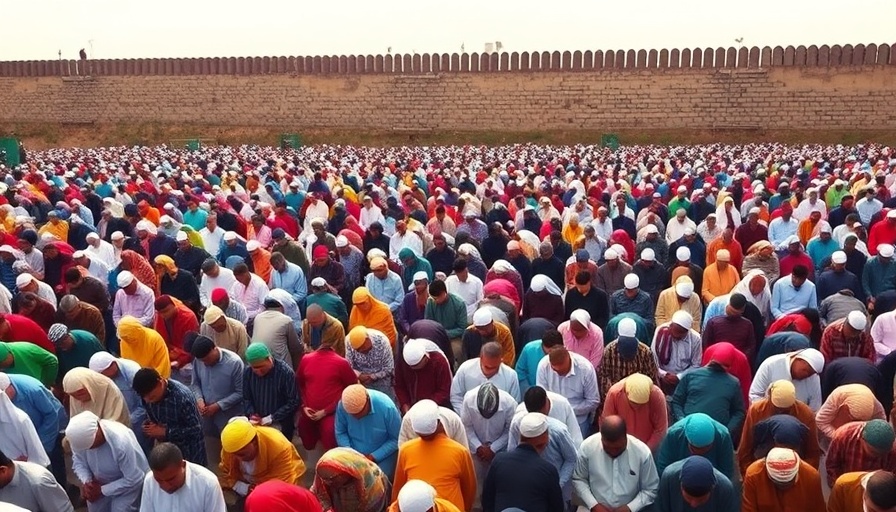
Eid al-Fitr in Goma: A Time for Unity Amidst Turmoil
This past Sunday, under the radiant morning sun, Goma—a city currently under the influence of the M23 rebel group—became a beacon of hope and unity as hundreds of Muslim worshippers gathered to celebrate Eid al-Fitr. This sacred day signifies the conclusion of Ramadan, a month of fasting and spiritual reflection for millions around the world. Yet, for the community here, it symbolizes much more than a religious celebration; it is a heartfelt plea for peace, a call for collective healing, and a testament to resilience amidst adversity.
In 'Eid al-Fitr in Goma: A call for unity and peace', the focus is on the profound significance of the celebration amidst mounting challenges, leading to our deeper analysis.
A Collective Plea for Peace
As worshippers, men, women, and children from diverse backgrounds united in prayer, their voices echoed a collective yearning for peace. Amidst the insecurity and division caused by ongoing conflict, the plea for solidarity resonated through the crowd. One imam's words struck a chord, emphasizing the importance of coming together regardless of linguistic, cultural, or ethnic differences. “We want to live in peace like before,” he articulated, invoking a shared vision for a stable future in Eastern Democratic Republic of Congo (DRC).
Reflecting on the Past: Lessons from Ramadan
This year's Ramadan, marked by the takeover of Goma by rebels, has not merely disrupted the flow of daily life; it has infiltrated the very fabric of religious tradition and practice. As tensions rose, the Muslim community faced unprecedented challenges, yet they relied heavily on the faith and communal bonds nurtured during the holy month. As worshippers gathered in celebration, they embodied the hope that spirit, prayer, and shared sacrifice could pave the way for a peaceful coexistence.
The Importance of Unity in Times of Conflict
The celebration of Eid al-Fitr in Goma serves as an essential reminder of the power of unity during conflict. For many in the DRC, this day was an opportunity to not only reflect but also to send a message to leaders—both local and national. The imams urged worshippers to remind the DRC government and conflict actors of their duty to work towards national reconciliation. Such calls for solidarity transcend individual grievances, inviting a broader dialogue that addresses systemic issues affecting the region.
Current Events: Understanding the Broader Landscape
While Goma's Ramadan ended in a vibrant celebration, it is crucial to contextualize this within the ongoing crisis in the DRC. The presence of M23 rebels has incited fear among communities, complicating efforts for peace and security. It's vital that outsiders grasp not only the immediate situation but also the historical dynamics at play in the region. The intertwining of religion and politics creates a complex landscape where faith communities are at the heart of the struggle for peace.
Creating a Future of Hope
Looking ahead, the community's collective prayers highlight the urgency of addressing not only peace but also socioeconomic conditions that undermine stability. Citizens aspire for governmental accountability, social justice, and opportunities for economic development. It is through embracing each other’s humanity that communities can forge pathways toward sustainable solutions that honor the dignity of all.
Engaging with the Broader Issues
For professionals focused on governance and development, the events in Goma present invaluable insights. Understanding local dynamics and the effectiveness of grassroots movements is crucial in shaping policy responses that reflect citizens' aspirations. Moreover, there exists a need for more robust international engagement to prevent Rwandan-style genocides and bring about conflict resolutions that include various community voices.
In conclusion, Eid al-Fitr in Goma encapsulates a powerful blend of spirituality, resilience, and the yearning for unity. It articulates the aspirational desires of a community striving for peace in a tumultuous environment. As we witness these events unfold, it is imperative for all of us to raise our voices in solidarity with the communities in the DRC. The call for peace resonates beyond borders—encouraging dialogues that inspire action toward a more amicable world.
Now is the time for professionals across sectors to reflect on how they can contribute to sustainable peace initiatives and uplift communities facing unprecedented challenges. Embrace this call to action, and let’s foster change not just within our organizations but in the lives of those seeking hope.
 Add Row
Add Row  Add
Add 




Write A Comment